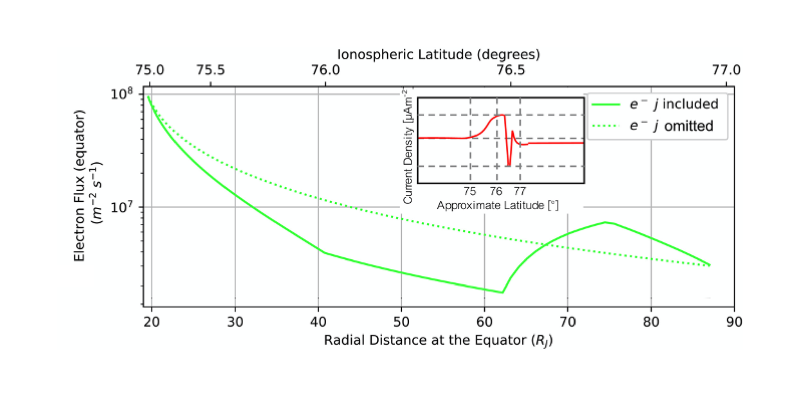MIST
Magnetosphere, Ionosphere and Solar-Terrestrial
Evaluating the ionospheric mass source for the magnetospheres of Jupiter and Saturn
By Carley J. Martin (Lancaster University)
Ionospheric outflow is a flow of plasma initiated by a loss of equilibrium along a magnetic field line. This induces an electric field due to the separation of electrons and ions in a gravitational field. At Earth, this process is initiated by dayside reconnection in the Dungey cycle. But, is this the case at the gas giants?
Valek+ (2019) show that there is an increased outflow on field lines which map between the moon Io and the auroral oval at Jupiter, and very little in the actual polar cap. Hence, in our analysis, we evaluate over these latitudes at Jupiter and Saturn. This also means we must consider a different driver than the Dungey cycle!
We developed a model which estimates the number of charged particles that flow from the ionospheres of Jupiter and Saturn. We also look at the effects of field aligned currents (FACs) and centrifugal forces on the total source rates of the outflow. At Saturn, the inclusion of these effects increase the total flux from the ionosphere, and it is now comparable to in situ measurements by Cassini CAPS. At Jupiter, the total particle source is found to be comparable to Io as a source of plasma in the magnetosphere. We find that the downward FACs and centrifugal force act to increase the flow of electrons from the ionosphere, and conversely upward FAC’s act to decrease outflow (see Figure below).
The additional mass flux into the inner and middle magnetospheres of Jupiter and Saturn can substantially affect the dynamics and composition and so must be included in any future assessment!

Figure shows an example of results for the electron flux mapped to the equator; solid green is with field‐aligned currents; dotted green is without field‐aligned currents. The insert shows the shape of the field‐aligned currents themselves. The electron flux is highly modified by the field‐aligned currents present, where it is enhanced by a downward current and retarded by an upward current in the auroral regions.
Please see the papers for full details:
, , , , , & , et al. (2020). The effect of field‐aligned currents and centrifugal forces on ionospheric outflow at Saturn. Journal of Geophysical Research: Space Physics, 125, e2019JA027728. https://doi.org/10.1029/2019JA027728
, , , , , & (2020). Evaluating the ionospheric mass source for Jupiter's magnetosphere: An ionospheric outflow model for the auroral regions. Journal of Geophysical Research: Space Physics, 125, e2019JA027727. https://doi.org/10.1029/2019JA027727